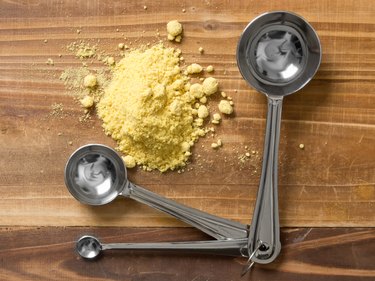
Mustard powder is finely ground mustard seed, which comes from three species of mustard plants, including yellow mustard, brown mustard and black mustard. Mustard powder contains the same nutrients that are found in the whole mustard seed and has several nutritional benefits. In powdered form, mustard has no smell when dry, but it has a hot flavor when mixed with water.
Phytonutrients
Video of the Day
Mustard seeds contain high amounts of phytonutrients, particularly glucosinolates, according to a 1990 study published in "Plant Science." Glucosinolates are a sugar-derived compound that is found naturally in many flowering plants. A study published by the "International Journal of Vitamin and Nutrition Research" in 2002 found that glucosinolates found in plants may have a protective effect against certain types of cancer, especially lung cancer.
Video of the Day
Healthy Minerals
Mustard seeds contain a variety of minerals, including iron, magnesium, zinc, calcium and phosphorus. Getting adequate amounts of these minerals is essential for the normal function of many biological and biochemical processes within your body and can help prevent a mineral deficiency, which can have potentially debilitating side effects. According to USDA National Nutrient Database for Standard Reference, ground mustard seed contains 26.6 percent of your daily calcium, 51.2 percent of your daily iron, 92.5 percent of your daily magnesium, 40.5 percent of your daily zinc, and 82.8 percent of your daily phosphorus.
Omega-3 Fatty Acids
Mustard seed is acidic and a source of omega-3 fatty acids, according to the book, "Today's Herbal Health: The Essential Reference Guide." The University of Maryland Medical Center states that omega-3 fatty acids found in some foods can benefit individuals with high cholesterol, high blood pressure, heart disease, diabetes, rheumatoid arthritis, systemic lupus erythematosus, osteoporosis, depression, bipolar disorder, schizophrenia, attention deficit disorder, skin disorders, inflammatory bowel disease, asthma, macular degeneration, menstrual pain and some cancers. However, omega-3 fatty acids are not intended to treat or prevent any disease. Consult with your physician before taking food items or supplements containing omega-3 fatty acids.
Antioxidant Properties
Mustard seeds and powder contain the amino acid, cysteine, which acts as an antioxidant in your body. Cysteine protects your body from free radicals, which are harmful compounds in your body that damage DNA and cell membranes, according to the University of Maryland Medical Center. Cysteine may also be useful in individuals who have angina, bronchitis, influenza and other conditions.
- "Plant Science"; Accumulation of Glucosinolates in Developing Mustard Seeds in Response to Sulphur Application; S. Kaur et al.; 1990
- "International Journal of Vitamin and Nutrition Research"; Glucosinolates: Bioavailability and Importance to Health; I.T. Johnson; January 2002
- FoodInfo.us: Mustard Seed, Ground
- University of Maryland Medical Center: Omega-3 Fatty Acids
- University of Maryland Medical Center: Cysteine